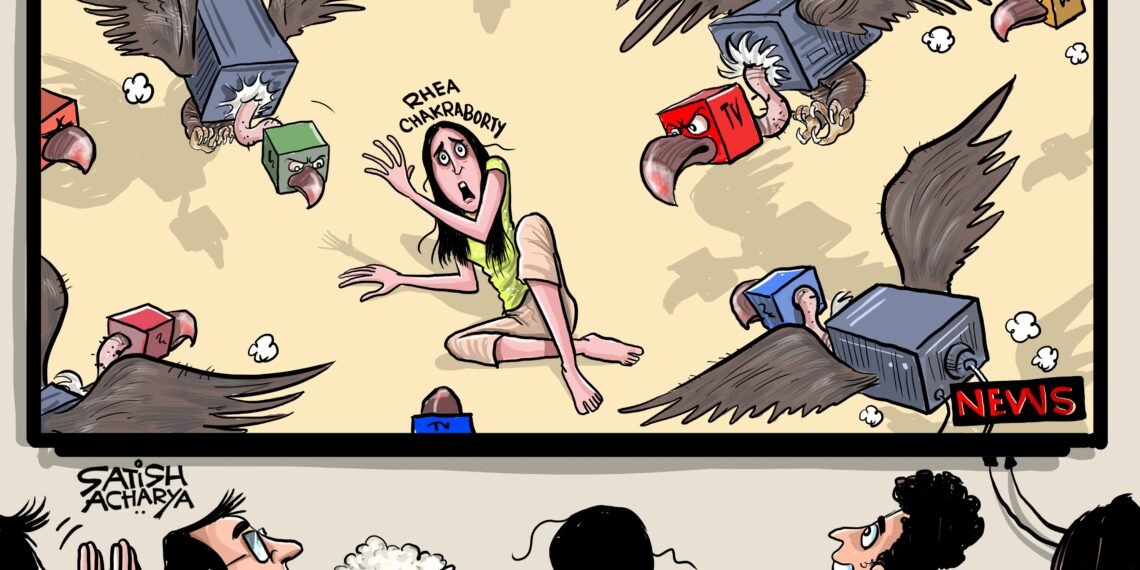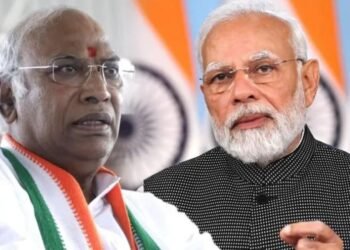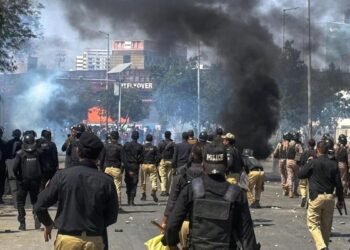The CBI’s closure of the Rajput case, ruling out foul play, has reignited calls for accountability from “Godi Media” channels that sensationalized the tragedy.
BY Navin Upadhyay
October 26, 2025: A wave of public outrage has erupted on social media platforms, particularly X, demanding apologies from prominent TV news anchors and channels accused of running a relentless smear campaign against actress Rhea Chakraborty following the death of actor Sushant Singh Rajput in June 2020.
The Central Bureau of Investigation (CBI) recently closed its probe into the case, concluding that Rajput’s death was a suicide and finding no evidence to substantiate claims of foul play or murder against Chakraborty. This development has reignited public anger against what many call “Godi Media” — a term used to describe media outlets perceived as biased and aligned with vested interests — for their role in vilifying the actress.
The Media Trial and Its Toll: After Sushant Singh Rajput’s tragic death, Rhea Chakraborty, his then-girlfriend, became the focal point of a media frenzy. Several prominent news channels ran months-long campaigns, leveling unverified allegations against her — ranging from drug trafficking to abetment of suicide and even murder.
Sensationalized headlines, prime-time debates, and speculative reporting painted Chakraborty as the primary culprit, often without credible evidence. The relentless coverage culminated in her arrest by the Narcotics Control Bureau (NCB) in September 2020 on drug-related charges, which many now view as a fallout of the media-driven narrative.
Chakraborty spent nearly a month in Mumbai’s Byculla Jail before being granted bail by the Bombay High Court in October 2020. The court’s order criticized the media trial, noting that it had caused significant harm to her reputation and mental health.
Despite her release, the damage was done — Chakraborty faced severe public shaming, loss of professional opportunities, and deep personal trauma.
CBI Closure Sparks Public Backlash: The CBI’s closure of the Rajput case in 2025, with no evidence linking Chakraborty to any criminal activity in his death, has fueled a growing chorus of voices on social media demanding accountability from TV channels and anchors.
@republic, Don’t you have any shame? Don’t you owe an apology to Rhea Chakraborty @Tweet2Rhea?
You crossed all limits of shamelessness in 2020 and haunted an innocent girl for months. You attempted the assassination of her character. Isn’t it time to say sorry to her? pic.twitter.com/h6lMh68D2d— Bhavika Kapoor (@BhavikaKapoor5) October 25, 2025
Users on X have been vocal, with hashtags like #ApologizeToRhea and #GodiMedia trending intermittently. Posts highlight how channels such as Republic TV and Times Now ran 24/7 coverage that demonized Chakraborty, often citing “sources” that were later debunked.
One X user wrote: “For months, Godi Media anchors screamed ‘murderer’ and ‘drug peddler’ at Rhea Chakraborty. CBI says no evidence. Where’s the apology? They destroyed her life for TRPs.”
Another post demanded: “Name and shame the anchors who ran hate campaigns against Rhea. They owe her a public apology on air.”
Night after night Rhea Chakraborty was called a murderer, witch, drug dealer and national villain, all on live TV.
Godi media turned her pain into prime time entertainment while the real investigation had barely begun.
Five years later the CBI gives her a clean chit, no foul… pic.twitter.com/rACyqXNQF6
— The Bad Engineer (@Satirical_Dhruv) October 24, 2025
Calls for Accountability: The term “Godi Media,” popularized to describe media outlets seen as pandering to political or corporate interests, has been central to these discussions. Critics argue that anchors prioritized sensationalism over ethics, weaponizing their platforms to target Chakraborty.
Social media users have specifically called out high-profile anchors, accusing them of orchestrating a “hate campaign” that spread misinformation and prejudiced the public against her.
The outrage has expanded beyond individuals to the broader media ecosystem. Activists and citizens are urging regulatory bodies such as the News Broadcasters & Digital Association (NBDA) to hold channels accountable for unethical reporting.
READ: Satara Doctor Suicide: Sub-inspector, Software Engineer Arrested
Some users have even called for legal action against media outlets for defamation and incitement, citing the irreversible damage to Chakraborty’s career and mental health.
Rhea Chakraborty’s Resilience: Since her release, Rhea Chakraborty has largely maintained a low profile, focusing on rebuilding her life. In rare public statements, she has spoken about the trauma of being “tried by media” and the toll it took on her family.
In a 2021 interview, she said: “The truth eventually comes out, but the scars remain. I was made a villain overnight.”
Supporters on X have praised her resilience, sharing posts celebrating her dignity and strength in the face of relentless scrutiny.
The Rhea Chakraborty saga has reignited debates on media ethics, trial by media, and the responsibility of journalism in shaping public opinion.
Experts argue that the case exemplifies how unchecked sensationalism can destroy lives, especially for women in the public eye.
“The media’s role in the Rhea case was a witch-hunt, plain and simple. It’s a wake-up call for stricter regulations,” said a Mumbai-based media analyst on X.
The growing demand for apologies reflects wider public frustration with the lack of media accountability.
As one user wrote: “If CBI found nothing, why did Godi Media run a 24/7 hate campaign? Apologize to Rhea Chakraborty and every person you’ve slandered for ratings.”
While some netizens hope for a public apology from the implicated channels and anchors, others remain skeptical, pointing to the lack of precedent for such accountability in Indian media.
Meanwhile, discussions on X continue to grow louder, with many urging Chakraborty to pursue legal recourse for defamation.
The case stands as a stark reminder of the power and responsibility of the media in shaping narratives. As public pressure mounts, the demand for accountability continues to echo — signaling a potential shift in how media trials are challenged in India.














